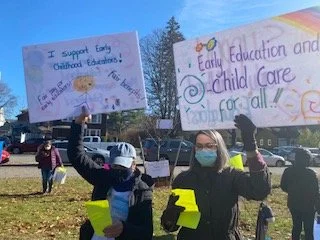Bristol County Perspectives on the Child Care Crisis
We have heard from various parents, educators, and providers across Bristol County who have generously shared their stories with us concerning their experiences with the early education and child care system.
Jennie A., an educator, says that “the lack of investment in high quality early education and care negates the importance of the work… Funding is always the biggest hurdle that we face each day. Most of our families rely on government subsidies in order for the children to attend one of our programs. Many families are living in challenging situations, and many of them, including the children, have dealt with trauma. Families continue to struggle to afford to place their children in high quality early education, and, unfortunately, many make a little too much to qualify for a subsidized slot. Every child deserves to experience the opportunity to be seen and celebrated and be given the tools they need to succeed.”
Elizabeth M., a Bristol County parent explains that “child care is important to me because I’ll never forget having to pass on a rewarding job opportunity because the salary would never cover my childcare expenses. I'll also never forget seeing my first year end statement from my daycare center and telling the owner that it must have been a mistake because there was no way I could have paid them that much for a year of childcare. Today's working parents are facing unprecedented challenges from all angles. We need to step up as a society to help them raise their children without sacrificing their financial stability, professional aspirations, family well-being and any future potential.” The financial burden that Elizabeth describes resonates deeply with families across the Bristol County as well as the Commonwealth.
Another parent, Elizabeth J., explains that access to affordable child care “would mean we wouldn’t be second guessing our hopes of having another child. We wouldn’t be crunching numbers and stressing out about child care costs when we think about having a second baby. As things are now, with a second kid we will be spending 20% of our gross family income on childcare.” Parents should not have to base their family planning around the cost for child care or early education.
Marlene P. takes a slightly different perspective as a grandparent: “The cost of daycare is so unaffordable that many families can't even come up with half the money. Our grandson has been in childcare since he was born, and the cost is $252 a week for four days. My son and daughter in law cannot afford this, and so we've had to come in and step in and help out. But what about if there are grandparents who can't help their kids? Wages are not keeping up with these childcare costs, and it's become completely unaffordable and not very available, so we need universal affordable childcare; it's long overdue.” Many grandparents are forced to step in as either caregivers themselves or financial support for grandchildren.
Finally, Soraya D. explains that “When I started to just get a feel for what [child care] was in the area, I quickly saw that there were a number of different thing that were lacking, and that piece was quality. Quality meant for me that individuals in a child care center looked like my son… and that was not what I found. [I ended up finding] a child care center that I sort of felt comfortable and good about, but there were a number of different things that it lacked, and so what I saw was this piece where… we want to have diversity.
She asks, “Where does the funding come from? How do we really uplift the voices of families' [and their] concerns and needs in a way that can then be equitable in quality?” Soraya speaks to the added challenges that families of color face when trying to access child care and early education.
These individuals and their experiences demonstrate the urgency of Common Start to cultivate a more equitable and healthy future for all.



